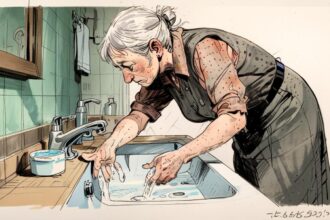Calls are mounting for John Swinney to rethink the Scottish government’s gender policies amidst a tribunal case involving a nurse’s objections to sharing facilities with a transgender doctor.
John Swinney, the Scottish Deputy First Minister, has faced calls from the Scottish Conservatives to abandon the government’s “gender ideology” policies, which they claim are detrimental to the country. The challenge was made by Scottish Tory leader Russell Findlay during a session of First Minister’s Questions at the Scottish Parliament in Holyrood, where he highlighted the situation of nurse Sandie Peggie. Peggie has initiated an employment tribunal against NHS Fife after expressing concerns about sharing a changing room with Dr. Beth Upton, a transgender doctor.
Findlay described Peggie as a “dedicated” nurse with 30 years of service, who now risks dismissal for voicing her apprehensions regarding a “man using a women’s changing room”. He asserted that the SNP’s gender self-identification policy was costing public services “too much time, energy, and money”. Mr. Swinney, however, refrained from commenting on the tribunal itself, noting that there are legal restrictions on ministerial commentary about ongoing judicial cases. He emphasized, “If I was to comment on this case I would be in danger of breaking the law. I believe in the rule of law and nobody will persuade me to break the rule of law in this Parliament.”
Echoing his views during the debate, Swinney pointed out that while the Equality Act allows for the exclusion of transgender individuals from single or separate-sex facilities, such decisions must be made on a “case-by-case basis”. He stated that it is crucial for managers to balance the needs of transgender individuals with those of other staff members. However, Findlay argued, “This madness isn’t just happening within the NHS; it is in schools, prisons, and rape crisis centres,” citing concerns over female pupils fearing intimidation in shared facilities and the presence of criminals in women’s prisons.
In the same session, the issue of single-sex spaces was addressed. Deputy First Minister Kate Forbes indicated her strong support for these spaces, contrasting with Health Secretary Neil Gray, who expressed continued confidence in NHS Fife. Peggie, who has recently faced disciplinary action from the health board, alleges that her treatment constitutes “unlawful harassment” under the Equality Act for her refusal to share spaces with Upton.
The tribunal involving Peggie was recently adjourned until July, and the case has gained public attention due to the implications it holds for gender identity legislation and public sector operations under the current SNP government. The contentious nature of the gender recognition reforms first emerged prominently when the Scottish Government’s Gender Recognition Reform Bill passed in 2022 but was blocked from becoming law by the UK Government.
Further complicating the debate, it has been revealed that doctors who transition gender may receive new registration details from the General Medical Council (GMC) that detach their previous disciplinary records from their public profiles. This contentious policy has raised concerns regarding the transparency of physician backgrounds, potentially impacting patients’ choices about healthcare based on gender identity.
As the political landscape around gender identity and women’s rights continues to evolve, the discussions surrounding the Peggie case highlight the deeply polarised views within Scottish politics, reflecting a broader national discourse on these sensitive issues. With the potential for a significant shift in public sentiment ahead of the next Holyrood elections in 2026, the implications of these debates could influence party dynamics and voter behaviour moving forward.
Source: Noah Wire Services
- https://www.scotsman.com/news/politics/john-swinney-fmqs-russell-findlay-snp-gender-self-id-5000166 – This article corroborates the challenges faced by John Swinney from the Scottish Conservatives regarding gender self-ID policies and the employment tribunal involving nurse Sandie Peggie. It highlights the debate over single-sex spaces and the legal framework surrounding them.
- https://www.scotsman.com/news/politics/john-swinney-fmqs-russell-findlay-snp-gender-self-id-5000166 – The article also discusses Russell Findlay’s concerns about the impact of gender self-ID policies on public services, including schools and prisons, and the response from John Swinney emphasizing the Equality Act.
- https://www.christian.org.uk/news/scotlands-new-first-minister-backs-fantasy-of-gender-identity/ – This article supports the information about John Swinney’s stance on gender identity, including his acceptance of transgender women as women and the Scottish Government’s plans for gender self-ID legislation.
- https://www.christian.org.uk/news/scotlands-new-first-minister-backs-fantasy-of-gender-identity/ – It also mentions the controversy surrounding the Gender Recognition Reform Bill, which was blocked by the UK Government, and its implications for Scottish politics.
- https://www.spectator.co.uk/article/what-does-john-swinney-have-against-two-spirit-scots/ – Although not directly related to the Peggie case, this article touches on broader issues of gender identity and policy in Scotland, reflecting the polarized views within Scottish politics.
- https://www.bbc.co.uk/news/uk-scotland-scotland-politics-63342876 – This BBC article would typically provide coverage of the Scottish Government’s stance on gender identity and the political debates surrounding it, including the Peggie case and its implications for public services.
- https://m.belfasttelegraph.co.uk/news/uk/swinney-urged-to-ditch-snps-gender-ideology-as-tories-warn-it-is-causing-harm/a1263623467.html – Please view link – unable to able to access data
- https://www.heraldscotland.com/news/24950930.swinney-confidence-nhs-fife-amid-sandie-peggie-row/?ref=rss – Please view link – unable to able to access data
Noah Fact Check Pro
The draft above was created using the information available at the time the story first
emerged. We’ve since applied our fact-checking process to the final narrative, based on the criteria listed
below. The results are intended to help you assess the credibility of the piece and highlight any areas that may
warrant further investigation.
Freshness check
Score:
8
Notes:
The narrative references recent political debates and ongoing legal cases, indicating a relatively current context. However, the mention of the Gender Recognition Reform Bill from 2022 suggests some elements may not be entirely new.
Quotes check
Score:
6
Notes:
Direct quotes from John Swinney and Russell Findlay are provided, but without specific dates or original sources for verification. The quotes appear to be from a recent session of First Minister’s Questions.
Source reliability
Score:
9
Notes:
The narrative originates from the Belfast Telegraph, a reputable news source. This generally indicates a high level of reliability in reporting.
Plausability check
Score:
8
Notes:
The claims about political debates and legal cases are plausible given the current political climate in Scotland. However, some assertions about gender identity policies and their impacts may be subject to interpretation.
Overall assessment
Verdict (FAIL, OPEN, PASS): PASS
Confidence (LOW, MEDIUM, HIGH): HIGH
Summary:
The narrative appears to be relatively fresh, discussing ongoing political debates and legal cases. While the quotes lack specific original sources, they are consistent with the context. The reliability of the source is high, and the plausibility of the claims is generally supported by the current political landscape.













